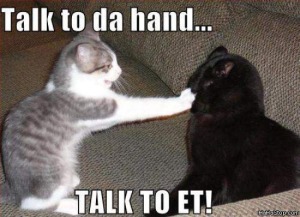2005, 210 p
Lynne Truss is right in many ways: we are surrounded by obnoxiousness, rudeness and aggression every day, exemplified by the Jerry-Springeresque “talk to the hand coz the face ain’t listening”. I must admit that no-one has ever said that to me directly, but unhappily I know exactly what it means.
Truss herself admits that the book is a “big systematic moan about modern life” and that’s what it is. It is only a short book, which is a blessing in a way- it’s a bit like sitting through a boxed DVD set of “Grumpy Old Women” and even for me there’s a limit to such unmitigated grumbling.
Her six good reasons to stay home are:
1. the absence of ‘thank you’ or ‘sorry’ (one of my own moans is the ubiquitous “if anyone takes offence…” )
2. the way that companies push their demands back onto you as your responsibility ( my contribution: the con of ‘self-serve’ in petrol stations which is slower for everyone and means that my oil is never checked and my tyres are always flabby)
3. the invasion of personal space (yes, the mobile phone in the train).
4. the “F### off” response ( I hate it but must also confess to being too ready to drop the F word myself. It’s a bad habit that I would like to work on)
5. Disrespect and non-deference (I agree: I don’t necessarily want my first name used by everyone)
6. the idea that someone else will clean up your messes (my own teeth-grinding trigger- junk food packaging thrown out of a car window).
We can all add our own- for example, it makes my blood boil when an unsolicited phonecall rings you then puts you on hold!!! I don’t thank John Howard for much, but tougher gun laws and the do-not-call register are two good things.
She makes the point that her book is not an etiquette or manners book, and now having read about the 19th century literature of this type, she’s right about that too. An etiquette book is premised on helping you as an individual to join the others, by doing the right things. The 19th century version was based on the precept that you could judge an individual by the way they behave, and that there is a connection between manners and morals. The outside world and the people in it was a world that the reader desperately wanted to be part of. If changes had to be made to one’s behaviour and demeanour in order to be accepted, that was a price gladly paid.
All this is reversed here. As she says, many people think that it is harmful, unhelpful and simply wrong to judge a person by the way s/he behaves (p. 193). Instead of the outside world being something we want to join, it’s them out there who are the problem.
It’s ironic that the 19th century version of the etiquette book was based on making “me” part of “them”. In the 21st century version, it’s all about me- with our ‘i’pads, and ‘My’ spaces and, heaven help us, ‘My’ school (which I still haven’t looked at because I don’t want my visit to count as approval of the whole concept). But now it’s me against “them” who are so obnoxious because they all care only about their own “me”. And let’s face it, who’d want to be them?
All these pronouns are confusing me (or I).


